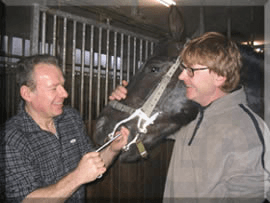
Evaluate the quality of dental work
How can a horse owner evaluate the professional quality of dental work? Unfortunately, there’s no general formula to do that. One step, though, is to find out what the educational background of the horse dentist is. Another step is to observe consciously and evaluate the practitioner’s work and conduct during inspection, evaluation, treatment and aftercare. Below we use the example of graduates of Pequinox Equine Dentistry to give you an idea what to look and ask for. Also know that dentistry is common sense and logic: if there’s anything that doesn’t make sense to you, don’t have it done.
Education
Louis’ graduates pass top standards:
- Successful completion of at least a four-week intensive seminar in a very small group (Level 1 Horse Dentist) is required. In contrast, some practitioners are trained less than one day, in a large group.
- All work is based on well-founded concepts and theories. These are constantly updated through research.
- Students are trained to treat causes not symptoms, and to consider the horse’s overall well-being.
- Monitored practical experience on an average of 75 living horses of all age groups is offered in the Level 1 Course.
- Completion of 120 case studies is required to be eligible for certification in Level 2.
- Students are trained in cooperative horse handling skills which help to make the treatment safe and easy for the horse. These make high doses of sedation unnecessary and give the horse the most pleasant experience possible.
- Students are trained to use precise instruments that are safe and easy for the horse. No use of electric floats. All power instruments are watercooled.
- Successful completion of a written exam is required.
- Successful completion of a practical exam is required.
- Students are trained to give lectures on horse dentistry (level 2).
- Students are trained to admit limits and to keep learning: access to professional support through Pequinox Equine Dentistry in case of uncertainties is encouraged.
As a result of this education, watching Louis’ graduates work demonstrates their qualification during inspection, evaluation, treatment and aftercare, too.
Inspection
- Horse-handling skills for safety and ease:
- Dentist gains the horse’s cooperation and doesn’t fight against it.
- Horse remains relatively calm; work looks easy.
- Inspections in most cases done without sedation.
- Dentist can easily tell the age group of your horse.
Evaluation
- Dentist explains in detail and in an understandable way the result of his inspection and his evaluation, how the problem was caused as well as what should be done and why.
- Whenever possible, treats causes not symptoms and considers the horse’s overall well-being.
Treatment
- Horse handling and dentistry skills for safety and ease:
- Accompanying veterinarian uses a relatively low dose of sedative.
- Work is smooth and looks easy; horse is relatively calm.
- Dentist doesn’t unnecessarily hurt the horse, works very precisely and in constant communication with your horse.
- Dentist uses precise manual rasps and watercooled power tools.
- Good results: Horse’s mouth is balanced and free from problems after the treatment, which prevents other abnormalities from developing.
After the treatment
- Dentist is honestly concerned about the long term well-being of your horse, stays in touch after the treatment to hear how the horse is doing and performing.
- Any problems are handled immediately.
- Horse remains relatively calm the next time dentistry is required.
Professional conduct:
- Dentist quotes price after inspection but before the work is done.
- Dentist is always open for your questions.
- Knows his educational limits and will say “I don’t know” or “I can’t do this” if he doesn’t know or can’t do something. He will enlist support to solve the problem if necessary by asking for knowledge and/or help.
- Dentist does all the work required. If something could not be completed for whatever reason he lets the owner know.
- He knows his physical limits and won’t treat more horses for the moment if 100% quality work can’t be ensured.
- Dentist demonstrates willingness to cooperate with other professionals, i.e. veterinarians or physiotherapists, as far as the welfare of the horse is concerned.
“Many of my customers have commented to me that they are totally impressed with the results of the work and they never thought that dental problems could affect so many areas of the horse, not only with respect to the eating habits but also in their overall well-being, behaviour and the way they travel.”
Silke Faass, Veterinarian, Alfeld, Germany

